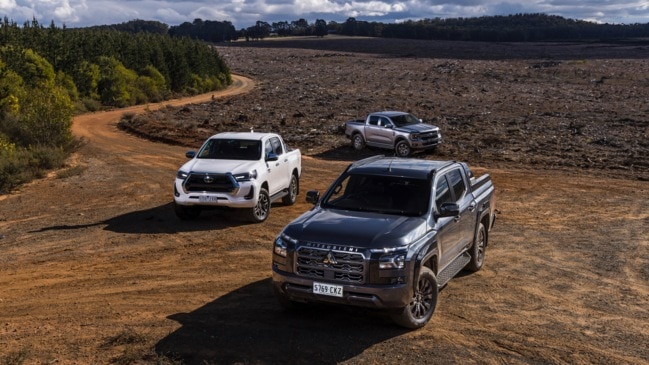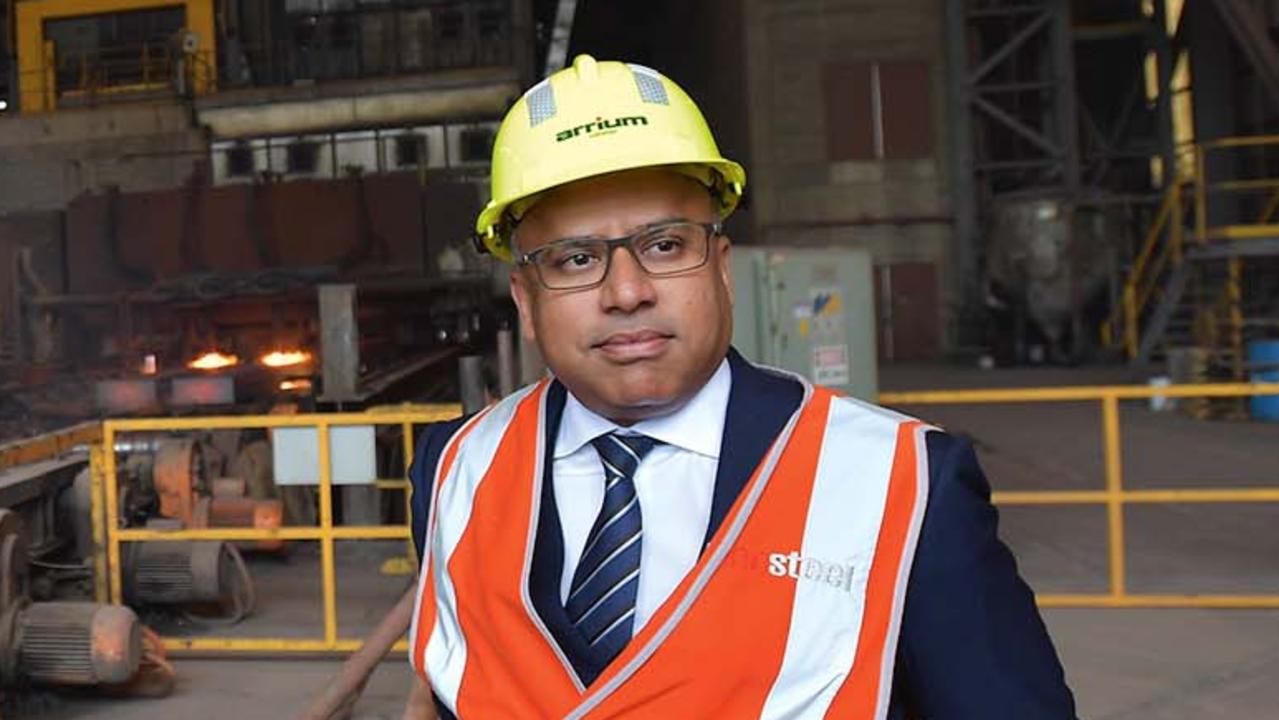ARB, Reece, Reliance: The ASX’s founder-led companies are winning the long game
They may not be the biggest names on the ASX but companies like ARB, that was founded by a band of brothers in Melbourne’s suburbs, are seriously delivering for investors.

Business
Don't miss out on the headlines from Business. Followed categories will be added to My News.
Founder-led companies have been quietly doing the hard yards on the ASX, building businesses offshore, and specifically in the US.
And despite the short-term earnings swings, they are rewarding their patient investors.
Players such as ARB, Reece and, to a certain extent, Reliance Worldwide may not be big names beyond their own markets, but they each are getting on building businesses for long-term returns.
The $3.3bn ARB is better known for its accessories used to trick up utes and 4WDs. There’s barely a Ford Ranger, Toyota HiLux or Isuzu D-Max on the road that doesn’t have an ARB bullbar, light rack or canopy.
Founded by Tony Brown and his brothers in Melbourne’s suburbs five decades ago, it is a serious business today worth more than $3.3bn, with about a third of its income coming from outside Australia.
ARB is now pushing ahead with expansion that includes doubling the size of its existing warehouse in Texas, and rolling out retail stores and more mini-distribution centres across the US west coast.
The organic strategy and bolt-on deals have worked over the decades, but with zero debt and the shares at two-year highs, everything points to a scale-building acquisition coming.
ARB’s big ticket is fitting out cars in aftermarket accessory sales, but its fastest growth is coming from working directly with vehicle makers to make sure ARB accessories are fitted as part of the original manufacturing process. This is a smaller slice of revenue, but sales to carmakers were up 40 per cent last year. There’s more contracts coming this year, including with Toyota.

The Brown family has a 20 per cent stake in ARB and, for much of ARB’s time as a listed company, has been driving the management. Tony Brown’s brothers Andrew and Roger were running the company for three decades, with Andrew as chief executive and Roger as chair. That all changed in 2022, when both stepped down.
Andrew remained on as managing director to drive culture and strategy. Roger remains as a director, but the family has handed over the running to trusted others. Long-time chief operating officer Lachlan McCann was appointed chief executive in 2022 and Andrew Fraser, a director since 2004, was appointed chairman.
The short-term investors hated the changes, but since then ARB shares have added almost 70 per cent and the growth story remains on track.
McCann is all about looking forward. He talks about keeping ARB top of mind with buyers through premium manufacturing and quality of design. He has deepened links with key carmakers such as Ford and Toyota, to make sure ARB products work seamlessly with their designs.
So too ARB invests and breathes life in fast-growing 4x4 culture, even offering lifestyle cooking and camping tips for a weekend away with the LandCruiser.
The US currently generates about $80m annually and is where the Browns, McCann and ARB are really focusing their energy. There is scope for products and car culture to work with Australian and New Zealand markets and this offers scale benefits in manufacturing, design and distribution. It is also ramping up e-commerce sales there.
A slowing economy has made the past year tough for sales there, but ARB is seeing early signs of a recovery in demand. However, its aim is the long-term market.
ARB has emerged from a tough year to still deliver an 18 per cent increase in post-tax profit to $102.7m. Over the past 10 years, ARB has delivered compound annualised pre-tax profit growth of more than 9.5 per cent.
Annualised sales growth over the period has come in at just under 9 per cent. Like most founder-led companies, it shuns debt, and keeps a tight grip on costs. Strong June quarter sales, particularly in Australia, saw ARB’s shares surge almost 6 per cent on Tuesday.
While the idea of an EV knocking the Ford Ranger off its perch as the nation’s top-selling ute seems a long time away, ARB is already thinking about the longer-term shift looming.
McCann points out all the top carmakers around the world have an electric strategy, and that means ARB needs to as well. He is confident there will be demand for ARB products in this electric future, however it arrives.
It is working with US EV maker Riven. In recent months it imported a Riven pick-up truck and it is pulling it apart at its Kilsyth factory to come up with a suite of products that work with the EV.
McCann says this relationship with carmakers means ARB can continue to deliver personalisation for drivers regardless of the drive train.
“Products like lock differentials and snorkels are going to really be challenged to sell in a future market on EVs, but there’s a heap of other accessories and really probably a more diverse range of accessories and complex accessories in the aftermarket we are going to have some great opportunities with,” he says.
McCann says ARB’s plans are “ambitious”. ARB is up more than 36 per cent on the year and its five-year share gains are 130 per cent.
Pipe dreams
Reliance Worldwide is another ASX company pushing further offshore, although these days it is more “founder tradition” than “founder-led”.
Brisbane’s Munz family steered the low-profile Brisbane plumbing supplies business through its stunning offshore growth and onto its ASX listing in 2016. Reliance is known for “behind the wall” plumbing parts, so the pipe drains and specialised hardware to make kitchens and bathrooms work as they do. It has also developed its push-to-connect “Sharkbite” technology to save on fitting and labour.
The Munzes progressively sold down their stake until a full exit in 2019, but the company continues to be driven by their hand-picked chief executive, Heath Sharp. Their traditions run deep.
The housing slowdown around the world might be hurting, but Reliance’s full-year profit numbers released on Tuesday was more about resilience. Headline profit was down 6 per cent at $US146.9m ($218.3m). Its sales were flat at $US1.2bn, despite new housing commitments sliding in Australia and the US.
The short term is proving a challenge, but it has long-term ambitions for the market. During the year, Reliance signed off on the acquisition of a small but significant Australian family-led business, Holman Industries, for $160m. This gave it a leg in “water out” plumbing products such as drainage and waster and pressure fittings.

Sales will continue to be flat in the coming year but all that feeds back into cost control and improved margins. When the US market returns as interest rates fall, Reliance is even more leveraged to a recovery. Reliance’s shares surged 8 per cent on the day.
Reliance counts big patient backers in its strategy, including AustralianSuper and Aware Super, which combined have nearly 20 per cent.
AustralianSuper also ranks among the top shareholders in ARB.
Another plumbing player, Reece – with its network of showrooms and distribution – this week posted full-year earnings and told a similar story of resilience in a tough market. Revenue and profit were up 3 per cent. But the US, which represents nearly half of sales, delivered better-than-expected growth. Still, the downbeat outlook in the face of a tough housing market here and offshore led to shares on Monday sliding more than 6 per cent at one point. They clawed back most of the losses by Tuesday.
Long-time watchers know Reece has a highly conservative outlook and, while there were warnings of near-term pressure in sales, it urged investors to focus on the longer-term structural drivers of demand for housing and infrastructure that drive demand for plumbing supplies.
Reece’s shares are up 30 per cent over the past year and have delivered nearly 160 per cent, before dividends, over the past five years. (The benchmark S&P/ASX 200 is up 22 per cent in five years.)

Reece is 70 per cent-owned by the Wilson family, and run by third-generation Peter Wilson.
This week it said former National Australia Bank CEO Ross McEwan would join the board from October. While McEwan the career banker may have limited plumbing experience, he knows how to run large, complex businesses. This suggests Reece is preparing to scale up to its next phase of growth.
Its last big move was the $1.9bn buyout of commercial and residential plumbing supplier Morsco six years ago. That deal supercharged its footprint in the US.
McEwan is likely to provide independent ballast in Reece’s boardroom, with succession planning under way. In November, Peter Wilson steps up as combined chairman and CEO, but has anointed Reece’s current US boss, Sasha Nikolic, as group managing director, running the business day to day.
And wedged among the Wilson family as a significant shareholder on Reece’s register is one name with a common link to ARB and Reliance: AustralianSuper.
eric.johnston@news.com.au
Originally published as ARB, Reece, Reliance: The ASX’s founder-led companies are winning the long game



